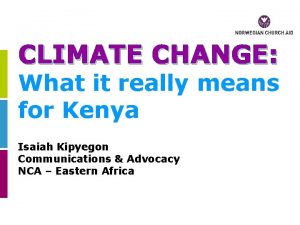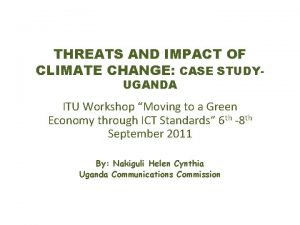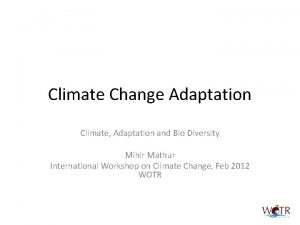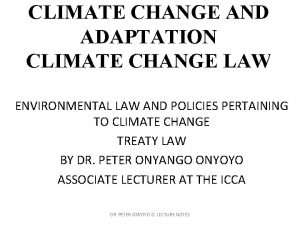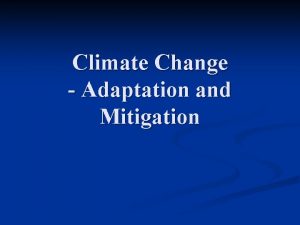Health Sector Adaptation to Climate Change Grenada Climate

















- Slides: 17

Health Sector Adaptation to Climate Change Grenada Climate Change and Health Vulnerability and Adaptation Assessment Dr. Francis Martin Mr. Dhanraj Ramkhelawan Rep. Ministry of Health Caribbean Climate Outlook Forum (Cari. COF) December 5 -6 th 2016

Grenada

Petite Martinique Carriacou Grenada • Tri-island state comprised of Grenada (mainland), Carriacou, and Petite Martinique • Size: ca. 133 mi 2 • Population: 110, 152 (July 2014 est. )

Climate Change – A Global Problem with local Impacts Projections • Mean annual temperature increase: – 0. 7 to 2. 6°C by the 2060 s – 1. 1 to 4. 3°C by the 2090 s • Increase in number of hot days/nights • Decreases in rainfall by up to 40 % by 2070 • Sea variables: – Sea Level & – Increases in surface temperature threatens marine environment Impacts • Heat-stress on infrastructure and population • Food Security – Droughts – Acidification of the Ocean • Insufficient water supply: – households, & tourism etc • 1 m of sea level rise: – 73% of Grenada’s major tourism resorts at risk, – 3% of agricultural lands could be lost • Damage vital infrastructure • More extreme weather events. including hospitals


Grenada’s V&A approach – Exploratory & Qualitative for NAP Development Literature Review Data on climate variability and change Key health information & disease data Information on policy, programs, partnerships Expert Interviews Interviewees from various ministries, CSOs, regional orgs. Country level needs and policy information Identification of key departments responsible for climate & health Stakeholder Workshops 1. Awareness raising in Grenada & Carriacou 2. Developing 5 year Health and Climate Change Action Plan 3. Linking epidemiological and meteorological data to Climate Change Vulnerability and Risk Analysis Based on findings of literature review and stakeholder workshops Analysis of diseases of importance Vector-borne, food and water-related diseases, respiratory diseases Identification of Adaptation Options Workshop to identify & rank key adaptation options for priority health risks Climate-proofing of Health Sector Corporate Plan and National Health Disaster Plan Development of draft Health and Climate Change Action Plan

Climate Change Action Planning with Ministry of Health, 18 June 2015


Climate Change Related – Health Risks Identified in Grenada Direct Health Impacts Due to extreme weather events and natural hazzards Physical injury, Death Heat stress and heatrelated illness Loss of livelihoods, Displacement, Psychological trauma Water, sanitation and hygiene related issues Food insecurity

Climate Change Related – Health Risks Identified in Grenada Indirect Health Impacts Due to rising temperatures and changing rainfall patterns: Infectious Diseases Vector-borne: Dengue, Chikungunya, Zika; Water-borne: Diarrheal diseases; Rodent-borne: Leptospirosis Due to airborne particulates from Saharan dust: Chronic respiratory diseases e. g. Asthma Acute respiratory infections Allergies related symptoms

Adaptation Needs Identified – The Health Sector Health risks Extreme weather events (direct effects) Specific adaptive measures Conduct more research on the complex inter-relationship between climate, vector ecology, and human health Disaster preparedness and mitigation Link data on epidemiology of diseases with climate data (including historical climate data) Disaster protection measures Health infrastructure resilience (Smart Health Care Facilities) Early warning systems Infectious diseases (indirect effects) General adaptive measures Improved surveillance of diseases and vector populations Integrated vector management, Evaluate effectiveness of vector control Implement an electronic health information system for improved disease surveillance, monitoring and control Implement a national information center – linked to relevant regional centers – containing detailed information on temporal, environmental and climatological data Solidify the institutionalized collaboration and cooperation at both inter- and intrasectoral levels Strengthen the capacity of Mo. HSS for evidence-based planning and budgeting

Outcomes of the V&A • Climate change aspects integrated into new health policies, plans and risk communication strategy • Climate sensitive disease surveillance integrated into Grenada’s National Action Plan as a priority program of action • Health & Climate Change Action Plan 2016 -2020 (HCCAP) outlined • Climate-resilient clinical waste management proposal drafted • Grenada’s climate & health activities presented at COP 21 in Paris, 2015 • National workshop on linking epidemiological and climate data held in 2015, together with CARPHA, PAHO and CIMH • Proposal to implement the District Health Information System (DHIS-2) in Grenada as a new health information & surveillance system.

Recommended Next Steps – • Drafting of TOR for an inter-sectoral and inter-ministerial climate and health working group (CHWG) who will lead all future climate and health related efforts • Finalize the Health and Climate Change Action Plan (HCCAP) with concrete adaptation actions • Develop a National Climate Change and Health Strategy based on the outcomes of this present study. • Strengthen disease surveillance and health information system (DHIS 2) • Collect, prepare, and digitalize available health datasets, including case data on climate-sensitive diseases and vector populations (Environmental Health & Epi) • Content modification in the health chapters of Grenada’s Second National Communication to the UNFCCC (SNC) • Explore the opportunities for external funding for climate and health related activities in Grenada

Collaboration – • GIZ, with the International Health Data Collaborative – secure funding to implement the (DHIS-2) in Grenada – Phase 2 of implementation – the inclusion of climate data in the system, to allow for analysis of climate vs. health data • Grenada would be the first country in the Caribbean region to attempt the joining of environmental, meteorological and epidemiological data to allow for the monitoring of case-sensitive diseases • Some challenges that still remains include: – Identification of one unit and timeframe for health, environmental, and meteorological data, so that mapping can be performed – Obtaining adequate type and numbers of climate data to perform historical analyses of health data on disease patters and distribution. – Health personnel not versed in reading and understanding climate data maps etc.

Conclusions & Questions Health impacts of climate change have already reached Grenada (e. g. Chik-V and Zika outbreaks…) V&A is a first step in understanding climate and health dynamics in Grenada • How can the METEOROLOGICAL COMMUNITY support us in our efforts? – Which experiences between meteorological & health communities have been made in the region? – How can climate modeling be used as a beneficial tool and an indicator for planning budgeting, decision making and policy development in health?

In detail – proposed actions Red bold text indicates actions that require support from meteorological community Identified Risks Proposed Actions Risks related to general framework conditions Inadequate human and - Provision of adequate human and financial capital - Institutionalise cooperation with relevant institutions (synchronisation with other departments) Limited collaboration and - Provide adequate training to relevant personnel and volunteers cooperation - Design and implement functioning monitoring system Lack of a functioning - Adoption of reviewed primary health care policy monitoring mechanism Risks related to climate change: Disasters (direct impact on health) - Revision (harmonization) of “Disaster Strategy” - Integration of “Safe Hospital” / “Smart Hospital” activities in the current “Programme Framework” of the Mo. H - Provision of hurricane proofed maintenance Disaster preparedness - Conduct research / evaluation on disaster preparedness Disaster protection measures - Improve management of emergency supplies - Review “Disaster Risk Reduction” (DRR) training curriculum and include climate sensitivity, climate sensitive diseases and emergency mechanisms - Conduct adequate training of health care personnel und volunteers in communities (once per year) - Establish a communication system (early warning) via SMS Risks related to climate change: Infectious Diseases (indirect impact on health) - Conduct research on vector management and vector control (analysis of effectiveness) - Include research on historical data of priority diseases (climate and land use data should be considered ) - Implement active surveillance and response system - Enable case detection, registration and confirmation through improved diagnostic tests and adequate mechanisms, • Vector-borne: Dengue, - Regular case reporting chikungunya, Zika - Comprehensive and adequate data analysis and interpretation (link health data with climate data) • Water-borne: Diarrheal - Design and implement adequate climate change related disease preparedness strategy (standards and diseases guidelines) • Rodent-borne: Leptospirosis - Enable response and control by improved data-usage and data-response in all relevant departments and institutions - Enable surveillance and response quality through adequate training of relevant health personnel (Nursing and Medical Assistants at national and community level) - Improve public awareness to vector control in cooperation with Na. DMA and other relevant actors

Thank you for your attention! Grenada Adapts to Climate Change. Now!
 Climate change 2014 mitigation of climate change
Climate change 2014 mitigation of climate change How is climate change our health
How is climate change our health Change management process in banking sector
Change management process in banking sector Waste collection grenada
Waste collection grenada Grenada trash pickup
Grenada trash pickup Cpea results 2017 grenada
Cpea results 2017 grenada Grenada trash collection
Grenada trash collection Health sector transformation plan ii ethiopia
Health sector transformation plan ii ethiopia Persuasive essay about global warming
Persuasive essay about global warming Karnataka state action plan on climate change
Karnataka state action plan on climate change What impact does the ocean have on climate brainpop
What impact does the ocean have on climate brainpop Climate change meaning and definition
Climate change meaning and definition Chapter 13 atmosphere and climate change section 1
Chapter 13 atmosphere and climate change section 1 Unit 9 climate change
Unit 9 climate change Conclusion of climate change
Conclusion of climate change Youreuropemap.com
Youreuropemap.com Conclusion of climate change
Conclusion of climate change Mathematics of climate change
Mathematics of climate change











